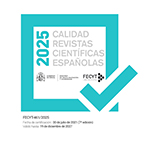Reescritura, compilación y contexto manuscrito: la traducción del motivo del incesto en la Vida de Santa María Egipciaca
Resumen
El tema del incesto es relevante en la apertura del Libro de Apolonio, texto hispánico en cuaderna vía del siglo XIII que principia el Ms. K-III-4 de la Biblioteca de San Lorenzo de El Escorial. El códice transmite otros dos poemas también de naturaleza clerical, aunque de dispar forma métrico-estrófica (pareados irregulares de rima asonante en lugar de consonante): la Vida de Santa María Egipciaca y el Libro de los tres reyes de Oriente. En la Vida de Santa María Egipciaca, el motivo del incesto pervive, a la vez que se resignifica a través de la práctica de la traducción medieval, que en este caso altera significativamente la fuente francesa del poema. El presente trabajo se propone ahondar en la problemática de la identidad manuscrita medieval a través de un ejemplo concreto de la traducción de un motivo de gran desarrollo en los siglos XIII y XIV como el del incesto y, asimismo, considerar las dinámicas de compilación de la literatura del periodo en función de su carácter contextual.











